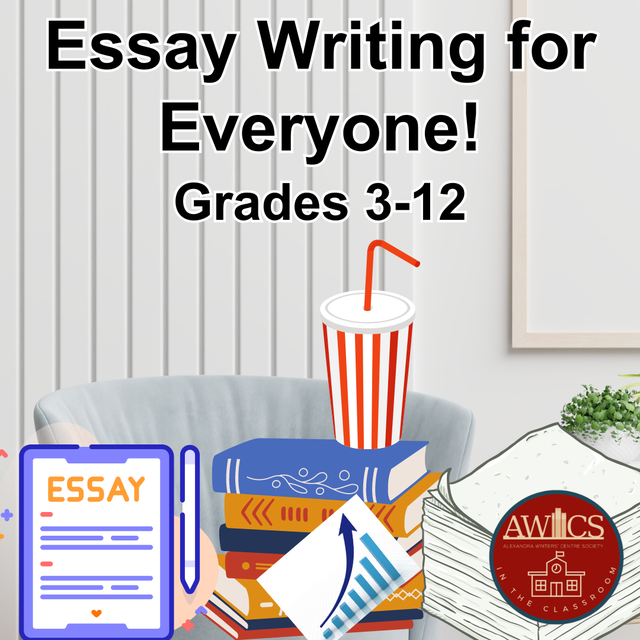- AWCS in the Classroom - Teachers and Students
- >
- AWCS In The Classroom
- >
- Essay Writing for Everyone! - G3-12 - Booking form
Essay Writing for Everyone! - G3-12 - Booking form
Essay Writing for Everyone!
Designed for the needs of students in Grades 3-12
What students will discover:
The basic five-paragraph essay format is used for so many assignments including articles, business letters, book reports, reviews, fun essays about a favourite animal, and more. All lessons will be grade-specific and include helpful hints to make essays not only easy but fun!
Outcomes:
- Students will familiarize themselves with the five main types of five-paragraph essays,
Persuasive essay
Comparison and Contrast Essay
Expository essay,
Evaluation essay
Narrative essay/Personal Narrative
- Learn to plan, research, and organize an essay, as well as keep track of their sources,
- Find out what a thesis statement is and how to use it.
- Explore acceptable grammar, reference formatting, citations, footnotes, hooks, statistics, anecdotes, and other ways of engaging your readers.
- Finally, students can learn other ways essays are used in the larger world and what they can do with an essay they particularly liked.
Curriculum Touch Points:
Grades 3-4
- Think critically about why authors write, their writing processes, and their audiences.
- Compare and contrast fiction vs. non-fiction text.
- Learn about methods of planning, researching, drafting, exploring figurative language, revising, and using writing conventions to create informative and engaging essays,
- Understand methods of presenting the findings of one’s research.
Grades 5-6
- Explore the historical, social, and cultural contexts behind texts, and understand authors’ perspectives and/or biases
- Effectively communicate ideas through writing, including planning, organization, and editing, to utilize language and develop a distinctive personal writing style.
- Develop research and academic writing skills, such as writing research questions and structuring informative essays
Grades 7-9
- Develop the relationship between form, content, and purpose, and how it influences the expression of ideas using personal opinions and understandings.
- Consider diverse points of view, personal experiences, and other sources to interpret texts, and consider how these factors can influence your perspective.
- Select and utilize strategies such as note-taking, paraphrasing, rereading, and group discussion to comprehend complex or unfamiliar texts.
- Consider historical content and authorial perspective when interpreting texts, and infer how texts may influence readers.
- Develop a research plan, find appropriate sources, gather information on various topics, discern the validity of historical information, balance external information with own opinions, and assess the value and type of information obtained.
- Utilize a variety of different types of research sources to present information/research with an appropriate organizational structure while coherently connecting it back to key ideas.
- Develop effective strategies for revising own work, as well as providing and accepting feedback from others by deepening one’s understanding of grammar conventions such as spelling, punctuation, tense, flow, etc., and learning to proofread work.
Grades 10-12
- Learn to plan and execute research by forming a research plan, selecting strategies for inquiry, and gathering information from appropriate sources.
- Logically organize information, including documenting and evaluating research sources for accuracy, appropriateness, and bias to draw conclusions on texts and assess the effectiveness of inquiry.
- Consider contexts such as audience and purpose and develop strategies for effective communication.
- Take ownership of academic text creation by selecting a concept or topic, establishing scope and focus, developing content appropriate to the form and purpose, and maintaining cohesion throughout, while additionally using effective strategies for revising and correcting issues where present.
- Appreciate the diversity of thought and expression, and learn to recognize the influence of underlying assumptions held by oneself and others including literary and historical thinking that have led to (mis)interpretations and continue to influence common assumptions.
Cost for schools
This program is best taught as a single session (K-1) or half-day program (G2-3). Multiple classes can experience this workshop over a day.
- $350.00 a session (60-90 minutes)
- $650.00 half-day session (morning or afternoon)
- $1200.00 for a full day
Save money by booking multiple classes!
For example: For the single full-day fee, you can book two single sessions for Kindergarten - Grade 1 in the morning and a half-day session in the afternoon for Grades 2-3.
Not in the Calgary area? Contact us about getting a remote instructor.
School on a tight budget. Let's chat. We may be able to work something out.


